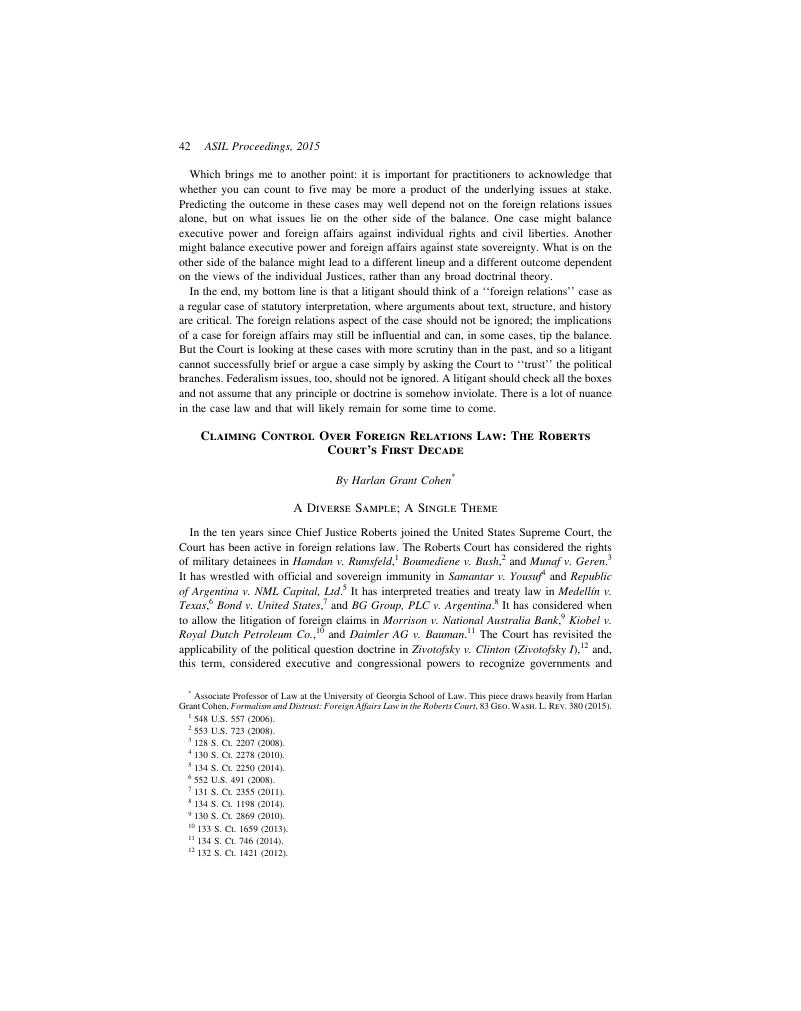No CrossRef data available.
Article contents
Claiming Control Over Foreign Relations Law: The Roberts Court’s First Decade
Published online by Cambridge University Press: 20 January 2017
Abstract

- Type
- Foreign Relations Law in the Roberts Court: The First Decade
- Information
- Copyright
- Copyright © American Society of International Law 2016
Footnotes
This piece draws heavily from Harlan Grant Cohen, Formalism and Distrust: Foreign Affairs Law in the Roberts Court, 83 Geo. Wash. L. Rev. 380 (2015).
References
1 548 U.S. 557 (2006).
2 553 U.S. 723 (2008).
3 128 S. Ct. 2207 (2008).
4 130 S. Ct. 2278 (2010).
5 134 S. Ct. 2250 (2014).
6 552 U.S. 491 (2008).
7 131 S. Ct. 2355 (2011).
8 134 S. Ct. 1198 (2014).
9 130 S. Ct. 2869 (2010).
10 133 S. Ct. 1659 (2013).
11 134 S. Ct. 746 (2014).
12 132 S. Ct. 1421 (2012).
13 135 S. Ct. 2076 (2015). The decision in Zivotofsky II might present something of exception to the trend described here, recognizing a broad, exclusive presidential power over recognition. The majority opinion though is not without its formalist flourishes, and the majority may have been trying to constrain Congress (part of the trend described here) even as it empowered the President. For more of discussion, see Cohen, Harlan Grant, Zivotofsky II ‘s Two Visions for Foreign Relations Law, 109 AJIL Unbound 10 (2015)CrossRefGoogle Scholar.
14 Youngstown Sheet & Tube v. Sawyer, 343 U.S. 579, 634 (1952) (Jackson, J. concurring).
15 Chae Chan Ping v. United States, 130 U.S. 581, 606 (1889).
16 Republic of Austria v. Altmann, 541 U.S. 677 (2004) (applying anti-retroactivity rules more flexibly to the Foreign Sovereign Immunity Act).
17 But see Reid v. Covert, 354 U.S. 1 (1957); Boos v. Barry, 485 U.S. 312 (1988).
18 Missouri v. Holland, 252 U.S. 416 (1920).
19 See, e.g., Dames & Moore v. Regan, 453 U.S. 654 (1981); Youngstown, supra note 14, at 634 (Jackson, J. concurring).
20 See, e.g., American Ins. Assn. v. Garamendi, 537 U.S. 1100 (2003); Crosby v. National Foreign Trade Council, 530 U.S. 363 (2000).
21 132 S. Ct. 2492 (2012).
22 252 U.S. 416 (1920).
23 See Cohen, Harlan Grant, Formalism and Distrust: Foreign Affairs Law in the Roberts Court, 83 Geo. Wash. L. Rev. 380, 439-45 (2015)Google Scholar (discussing potential future targets).
24 Sitaraman, Ganesh & Wuerth, Ingrid, The Normalization of Foreign Relations Law, 128 Harv. L. Rev. 1897 (2015)Google Scholar.
25 Kiobel, supra note 10, at 1669.
26 Bond v. United States, 134 S. Ct. 2095–96 (2014) (Scalia, J., concurring).
27 Clapper v. Amnesty Int’l USA, 133 S.Ct. 1138, 1155 (2013).
28 Ashcroft v. Iqbal, 556 U.S. 662 (2009).




